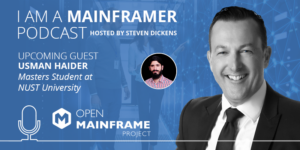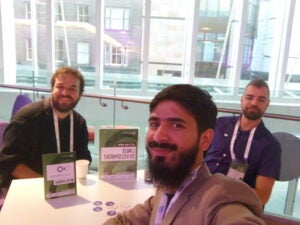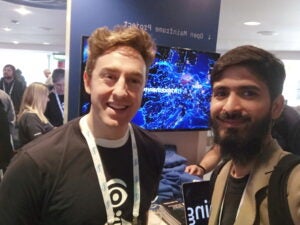In today’s episode of the “I Am A Mainframer” podcast, Steven Dickens sits down with Usman Haider. Usman is a masters student at NUST University in Pakistan and an alumni of the Open Mainframe Project internship program. Usman tells Steven about his experience in the program, his thoughts about the mainframe, and it’s future.

Steven Dickens: Hello, my name is Steven Dickens and you’ve tuned into the I Am A Mainframer podcast, brought to you by the Linux Foundation. We’re a collaborative project under the Linux Foundation focused on the mainframe platform. And I’m joined today by Osman Haider who’s one of our former interns and who’s also loved the experience so much the discipline for this year’s internship program. Usman’s a master student at Nest University in Pakistan. An end to end developer who’s got experience with several programming languages. I’m really excited to talk to us as men. Usman, welcome to the show.
Usman Haider: Thank you. It’s a pleasure to be here with you today.
Steven: Fantastic. Usman tell the listeners and me a little bit about yourself. Tell us a little bit about your background and what you’re doing out there in the community.
Usman: So I am basically an electrical engineer. I did my bachelor’s in 2011 and since then I’ve been developing software in different programming languages. I’m an electrical engineer, but my interest in software is growing because of the open source community. And I love to contribute to open source projects and technologies, and my main interests are Linux development open source software development packaging cloud technologies software development for embedded systems. Currently, I am working towards overdevelopment I am and I am really interested in that.
Steven: Oh, fantastic. So interesting background not been in the industry that long, which is always good to hear. Tell me a little bit about how you got interested in the mainframe.
Usman: So, I am basically using Linux for more than five years. Last year when I was looking for an open source project to work during the summer, I came across a blog post and there was a topic that was mentioning the Master the Mainframe contest. So, I read the read about that and I started using the Z/OS system. And then I got to learn about the mainframe systems. That’s how I got inserted in mainframe, it’s power, it brings to the table, and the security. That was really when I decided to join the mainframe community.
Steven: Tell me a little bit about how you found the Master the Mainframe contest what your perspective was getting onto the platform and how you really found that as an on-ramp into the technology.
Usman: So I really like the idea about the contest, because it gives you a hands-on experience. It gives you access to the platform in a way that you don’t get. You don’t get access to Z/OS or the mainframe. For example, Linux architecture or the x86 machines are everywhere, but the Z systems or the mainframe systems are very hard to find. You don’t have any online access to those systems. So for students, it is a very good opportunity to get hands-on with the mainframe architecture and the z/OS.
It also covered all the technologies. So, I really the mainframe and I recommended it to other students as well and I am planning to do this again next year.
Steven: Oh, fantastic. So, you’re looking to enter the competition again next year?
Usman: Yes. And I’m also telling other students to go look for the contest and get hands-on with the mainframe contest, because I came to know that this skill is valuable. You can get people that know c++, Python, & x86. But this skill, I find it rare. So that’s why I am telling my fellow students and my fellow colleagues as well to really get hands-on with this.
Steven: Fantastic. So, you were an alumni of the Open Mainframe Project internship program, which just I think closed the applications for 2019. Could you give us a perspective of how you found that program what you were working on, and what your project was like?
Usman: So, I like the whole process of that internship program right from the student application to selection and to the completion of the internship program. The application process is very easy and consisted of answering a few questions only. You just have to give a few details about the project you are proposing. So, it’s not very hard for a student to apply. It’s not very time-consuming. So, it’s very easy for the students to apply and also there are a lot of good projects for students to choose from. There was information about the mentors, so they can always contact their mentors and see if a project fits their skill. So, my past experiences are very good.
I really like the idea of the kickoff call where all the selected students interact with each other. They tell each other about their skills and what projects they will work on. So, everyone knows who will be working on which project which is very good.
Steven: So I know to see it in the notes that was shared before us joining the podcast together that you did some really cool projects in your internship. Could you maybe share what you were doing with some of the listeners, so they can get an awareness of some of the projects that you were involved in?
Usman: So I selected the project that was titled “Increase the number of s390x packages in SUSE Package Hub Project”. Although I had development and very basic software packaging experience, I never used something like Open Build Service. Open Build Service is a platform that allows you to package your software for different architectures and different distributions. So, a large number of developers are using OBS for packaging and many companies are also making use of it. So obviously it is a very active IRC channel and community, and they collaborate very well. So, I saw this as an opportunity to learn from and interact with experienced individuals and professionals.
So, during the internship, I worked on packaging the open source software for the s390x architecture. The main idea was to select different software packages like Zabbix, Icinga and Cacti that are monitoring packages, and to build and test those packages for S390X architectures For that testing, I got online access to the S390C machine using the IBM community cloud. I built all the software and then I deployed the software on the s390X. Then I tested the software, removed any bugs or reported any potential bugs to the community of mainframers.
There are a lot of open source packages available for Linux and what we were targeting in that project was to pull those packages to s390x as much as we could. So we were four students that were working on that project and we have all contributed a large number of packages. People can use those packages on S390 X machines. All those packages are available now on OBS and anyone can use them.
Steven: Fantastic. So it sounds like you had a packed few months. What were the biggest challenges that you faced and kind how did you overcome them?
Usman: The biggest challenge as an intern was to get started. There were a lot of projects and the biggest challenge was selecting the right project. But after that, there was a great mentorship from my mentor. He worked at SUSE as an engineer and he really helped us a lot. Everything worked as planned. So, there were no problems during the internship. So, the only challenge I think, was the project selection, because there were so many group projects and good mentors.
Steven: Okay. So, I noticed here in some of the notes that you’ve started to get involved in the Zowe community and that you’ve started to contribute and engaged there. How’s that been as a new platform to really get involved with? Obviously, it looks like you’ve done some good work in the Linux space. How are you finding that sort of front end to the z/OS environment, IE: Zowe?
Usman: So after I went through the Master the Mainframe contest, the feed it gives you is not very user friendly. It’s a black screen and you get to use a keyboard, and you navigate from using the keyboard. But after getting to know about Zowe in the last open source conference in Anambra, IBM introduced to Zowe. I really like the interface.

The reason why I’m so excited is that it is going to change the feel of the mainframe. I see this could be a big shift. It can attract more users and more customers. The purpose of Zowe I think is to make the platform more accessible. But in the meantime, we should not compromise on the scalability and security or any other useful feature that the platform is currently providing.
So, I think Zowe will bring in contribution from the large open source community because it’s an open source project. All of the open source developers can contribute and there is access to the Zowe machine. I think this can lead to potentially increase the number of consumers as well. So that’s why I’m really interested. We can make a big shift in the mainframe.

Steven: That’s an interesting perspective I think even with your insight, you’re spot on with where the community sees in that platform and the impact it’s going to have on both the existing mainframe clients but also bring in new clients into the platform.
So one of the questions I always ask my guests on the show is, where do you see the platform in two to three years time? How do you see some of the shifts we’re seeing in the mainframe space?
Usman: The mainframe in two or three years will be about adding security, the Internet of Things. The machine learning internet of things. Everything is connected, so that’s security’s main concern.
With the IoT and machine learning coming, you need a computational power as well. So, the mainframe is providing you both the computational power and security. The two main technologies you need in two to three years. I have seen technologies at the open source summit, the machine learning things on the IBM platforms, the speech to text things and the image recognition things on the IBM mainframe platforms. So I really see mainframe growing in these two fields. So I really see a big boost or increase in two, three years.
Steven: Yeah, we tend to see the same thread. I mean, it’s interesting seeing have clients are picking up on that security thread. I was reading an interesting piece that says your organization is either a data securer or a data abuser. I think a lot of people are going to see themselves on either side of that. People are going to choose who they place their business with depending on whether people are a data securer or an abuser. I think obviously we see the mainframe as a platform to enable people to secure their data provide that trust that clients.
So, as we start to wrap up. Is there anything else you want to share with the group before we bring this to a close? Are there any other parting comments?
Usman: One thing I want to mention is that there is not so much awareness in students and universities about the mainframe. Maybe I am wrong, but that that is what I think. When I attended the conference last year, I met people from different universities. There were people from 80 countries at the last Open Source Summit and I discussed mainframes with them, and there were I think only 10% of people who really knew about the mainframe. So, I wanted to highlight this point that if there could be a promotional campaign or some awareness. The community is already doing great. They are very welcoming to new people, but maybe if something can be improved, about the awareness of the mainframe and the access to the mainframe can be useful for the mainframe and the community as well.
Steven: You’re taking a part in that promotion today by spending some time with us on the Open Mainframe Project podcast. So, thank you for helping us get the message out Usman. It’s been great to talk to you. Thank you very much for your time today.
Usman: Thank you so much. Thank you for giving me your time and for giving me the opportunity to talk about the mainframe.
Steven: So thank you for listening. My name is Steven Dickens. I’ve been your host today. I’ve been joined by Usman Haider who’s one of the great community members impacting how this platform is perceived out there in the academic community and in the community as a whole. Hopefully, we’re going to be seeing a lot more advertisement as he continues to expand these efforts. Please subscribe to this podcast for future episodes. And with that, I’ll bring today’s episode to a close. Thank you for joining us on The Open mainframe project. I’m a mainframe or podcast.